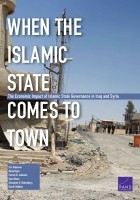| 来源类型 | Research Reports
|
| 规范类型 | 报告
|
| DOI | https://doi.org/10.7249/RR1970
|
| ISBN | 9780833098559
|
| 来源ID | RR-1970-RC
|
| When the Islamic State Comes to Town: The Economic Impact of Islamic State Governance in Iraq and Syria |
| Eric Robinson; Daniel Egel; Patrick B. Johnston; Sean Mann; Alexander D. Rothenberg; David Stebbins
|
| 发表日期 | 2017
|
| 出版年 | 2017
|
| 页码 | 260
|
| 语种 | 英语
|
| 结论 |
Military Pressure on ISIL-Held Areas Has Dampened Economic Activity and Prevented ISIL from Fully Governing According to Its Stated Goals- This pressure has contributed to significant economic decay in ISIL-held territory and limits ISIL's ability to profit from taxation and gain popular legitimacy.
ISIL's Strict Governance Is Not Necessarily Self-Defeating- Local economies that struggled under ISIL control did so not because taxes were too high or social regulations too restrictive. The struggles largely coincided with military efforts to disrupt ISIL control.
ISIL Showed Signs of Successful Stewardship over Local Economies but Also Signs of Incompetence and Indifference- In multiple cities, ISIL prioritized electricity provision to hospitals and key infrastructure even in the face of larger electricity shortages.
Electricity Consumption Has Suffered the Most of All Economic Activity Under ISIL Control- Electricity consumption in ISIL-held areas showed the most-significant declines from pre-ISIL levels of activity.
- After liberation, these effects linger.
Flows of Internally Displaced Persons Begin Well Prior to Liberation- Planning for liberation of ISIL-held cities must take into account the fact that these flows begin well before the first military forces enter an ISIL-held city.
Markets Do Not Return to Normal Activity Immediately After a City Is Liberated- Markets are partially damaged by fighting during ISIL's retreat and appear largely empty following liberation because residents fled the fighting.
Bureaucratic Capacity Likely Remains in Areas Liberated from ISIL- Liberating forces are likely to encounter local doctors, engineers, and bureaucrats who either voluntarily worked for ISIL or were co-opted into doing so.
|
| 摘要 |
- Given that ISIL's strict governance is not necessarily self-defeating, military efforts to retake its remaining territory and prevent a resurgence of the group remain critically important.
- Stabilization planning for the liberation of areas still controlled by ISIL should focus on procuring power supplies and rebuilding energy infrastructure. Implementers should be prepared to provide this assistance well beyond the first few months after liberation.
- Planning for humanitarian assistance surrounding liberation must take into account the location and unique needs of internally displaced persons.
- Stabilization planning should focus on working with liberating forces to effectively and fairly distinguish between ISIL sympathizers and unsympathetic locals with the needed institutional knowledge to help provide public services after cities are liberated.
|
| 主题 | Counterterrorism
; Economic Development
; Iraq
; The Islamic State (Terrorist Organization)
; Public Sector Governance
; Syria
; Terrorism Financing
|
| URL | https://www.rand.org/pubs/research_reports/RR1970.html
|
| 来源智库 | RAND Corporation (United States)
|
| 引用统计 |
|
| 资源类型 | 智库出版物
|
| 条目标识符 | http://119.78.100.153/handle/2XGU8XDN/108563
|
推荐引用方式
GB/T 7714 |
Eric Robinson,Daniel Egel,Patrick B. Johnston,et al. When the Islamic State Comes to Town: The Economic Impact of Islamic State Governance in Iraq and Syria. 2017.
|
|
文件名:
|
x1505267806260.jpg
|
|
格式:
|
JPEG
|

|
文件名:
|
RAND_RR1970.pdf
|
|
格式:
|
Adobe PDF
|
除非特别说明,本系统中所有内容都受版权保护,并保留所有权利。